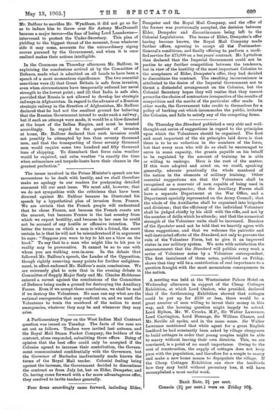On Thursday the Standard published a very able and well-
thought-out series of suggestions in regard to the principles upon which the Volunteers should be organised. The first and most important of the six principles laid down is that there is to be no reduction in the numbers of the force, but that every man who will do so shall be encouraged to serve in some capacity, the grants payable on his behalf to be regulated by the amount of training he is able or willing to undergo. Here is the root of the matter. If this were adopted and acted on, we could, speaking generally, educate practically the whole manhood of the nation in the elements of military training. Other essential suggestions are that the Volunteers shall be recognised as a reservoir of men capable of being used in all national emergencies ; that the Auxiliary Forces shall have a separate Department at the War Office, and a Department specially represented on the Army Council ; that the whole of the Auxiliaries shall be organised into brigades and divisions; that the efficiency of the individual Volunteer shall be judged chiefly by his skill with the rifle, and not by the number of drills which he attends ; and that the numerical strength of the Volunteer units shall be increased. Readers of the Spectator need not be told that we heartily agree with these suggestions, and that we welcome the patriotic and well-instructed efforts of the Standard, not only to prevent the ruin of the Volunteer Force, but to give it an improved status in our military system. We note with satisfaction the announcement that the Standard will publish every week a series of Volunteer notes by a Volunteer correspondent, The first instalment of these notes, published on Friday, shows that they will be a contribution of real importance to a question fraught with the most momentous consequences to the nation.






































 Previous page
Previous page